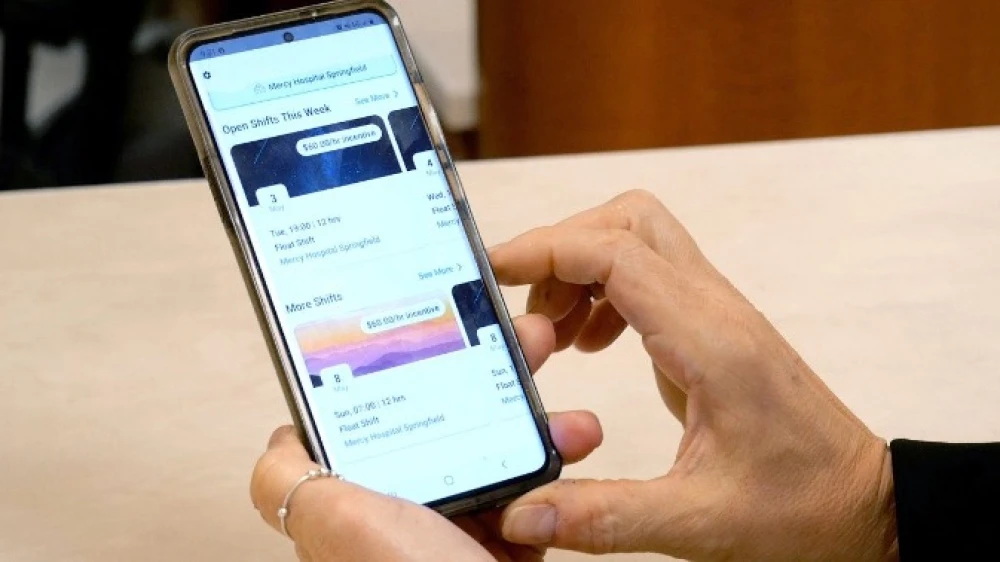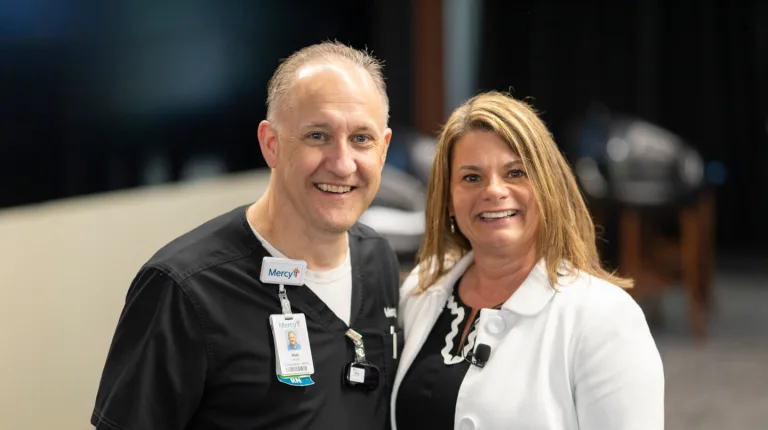Imagine being able to pull out your phone and, at the click of an app, build a flexible work schedule with nursing shifts customized for your skill set and lifestyle. A schedule that allows you to work as much or as little as you want, at the shift times that work best for you.
It might sound like a dream, but for the nurses at Mercy, a multistate health system based in St. Louis, MO, this dream is a reality, thanks to the visionary leadership of Betty Jo Rocchio, DNP, MS, RN, CRNA, CENP, EBP-C and her team.
As Mercy’s senior vice president and chief nursing officer, Rocchio watched staffing shortages increase over the past decade. Nurses were retiring, experiencing burnout or leaving the profession to handle family responsibilities. Then, the pandemic hit, exacerbating an already serious situation. At the same time, gig work was catching on nationwide as an option to traditional scheduling.
“Our nursing leadership noticed that when nurses could, they picked travel nursing both for pay and flexibility to choose their schedule,” says Rocchio. “So, we sought out similar innovation for Mercy. By providing new options and giving them flexibility to thrive, we knew we could attract the very best caregivers for our patients."

Rocchio, who began her career as an RN in the intensive care unit, knows joy in the work of nursing is possible when nurses have a happy, healthy work/life balance. “We wanted to support Mercy’s nurses and clinical team at work, and also send them back to their families and personal lives whole and feeling good about taking care of patients,” she says. “Innovation is a must-have for our teams! Nothing affects daily execution more powerfully than culture, and a culture of innovation supports a winning team.”
To achieve their vision, Mercy’s leadership embraced strategic disruption. Bypassing traditional channels, they took their concept high-tech, partnering with the tech experts at an external technology company to create Mercy Works on Demand (MWOD). A novel scheduling platform with its own app, MWOD reduces friction and increases flexibility by putting shift choice into the hands of nurses.
Handing Flexibility to Nurses Creates More Workable Solution
Like apps for gig workers on popular ride-share or food delivery services, the MWOD platform allows full and part-time nurses to enter the workforce on their own terms. The app customizes itself to each user’s preferences. Core staff choose their preferred shifts, then flex co-workers fill in the gaps. Less-attractive shifts, like overnight hours, are incentivized at a higher rate to attract gig workers.

“We essentially created a gig, on-demand nursing marketplace with a shift pickup app,” says Nida Al-Ramahi, MHA, CSSGB, executive director of operations for Mercy nursing services. “It’s a work opportunity that meets people where they are at in their lives.”
MWOD offers a simple, one-stop scheduling solution not only for hospital system’s full and part-time nurses, but also for other experienced nurses outside the Mercy system who want to pick up shifts. Using the app, nurses pick up the shifts that work best for them – even if it’s just for a few hours a week. They can see the compensation and make choices that most benefit them and their family in a work setting that matches their skills and interest.
“We onboard our gig nurses to become recognized co-workers,” says Al-Ramahi. “They go through our orientation process; they meet our standard of clinical competency. Sophisticated technology is able to verify credentials and clinical competency, assuring nurses are placed where they are qualified.”

To test the idea, the nursing team launched a pilot program at Mercy Hospital Springfield in April 2022. The pilot was so successful that Mercy rolled out MWOD across the system’s 30 hospitals, and by the end of 2022, more than 85,000 shifts had been claimed by 5,727 users.
The results speak for themselves – fill rate, which measures care and resources available to patients, has improved to the target rate of 86%, while the total cost to deliver care has decreased 12%, and the amount spent on agency staffing has been cut in half.
“We've really restructured the way we deploy and think about our workforce,” says Al-Ramahi, “with an overwhelmingly positive response from nursing staff, who feel reassured that they can take leave, work shorter shifts, or otherwise adjust their schedules while remaining at Mercy.”
Innovating to Improve Nurse Well-being and Patient Outcomes
Like any innovation, disrupting the traditional method of workforce deployment can be perceived as risky. Nursing requirements and eligibility issues must be addressed; technology and infrastructure must be continually reviewed and reinforced.
“The senior leadership team in Mercy rallied behind the concept,” says Rocchio, who admits to initially receiving “a few weird stares” from peers over the concept of gig work in the nursing space. The change required a concise plan with clear explanations of where technology interfaced with people and processes.
“Everyone has a different tolerance for change and looking for those early change agents can help move things forward,” Rocchio says.
Mercy’s nursing visionary is already dreaming of creating a complete mobile clinical platform to better support nurses at the bedside. “Today’s nurses are smart, tech savvy and learn best in a digital world,” says Rocchio. “I want a digital platform to connect the entire nursing/clinical co-worker lifecycle to improve co-worker engagement with their patients and leaders to form a seamless experience. Let’s call it a tech-enabled retention strategy for bringing back the joy in practice!”
Click here to learn how Johnson & Johnson is committed to supporting a workplace culture and environment where nurses thrive.




